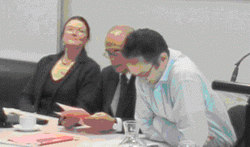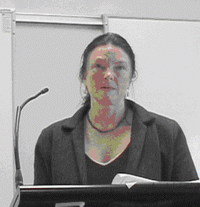

Início
Series of Public Forums in partnership with the Human Rights Commission
por Betsan MARTIN
Temas fortes ligados:
Governança, Direitos humanos, e responsabilidade .
Temas largos ligados:
Indigenous peoples .
Human Rights .
The Charter of Human responsibilities committee in New Zealand is hosting a series of public seminars in partnership with the Human Rights Commission. The Human Rights Commission supports public forums and has an extensive network for citizen participation and discussion in matters of public interest.
The forums we have co-hosted were in Wellington, they are to encourage public information and debate on topics relevant to Human Rights and Responsibilities.
In July 2006 we hosted a symposium on Responsibility and Rights in New Zealand and the Pacific region from the perspective of indigenous knowledge. Approximately 95 people attended.
A long discussion followed in which participants discussed the way in which Human Rights are often seen as a form of imposition western systems in the Pacific, because policies are introduced in the name of ‘rights’ to over-ride customary or traditional practices. A recent example is in social policy on child care. An approach of ‘Responsibility’ was felt to be more aligned with Pacific practices, in its collective focus and ethical dimensions.
Three speakers:
Dr Te Ahukaramu Charles Royal – researcher on the potential of indigenous knowledge
The Potential of the Knowledge of Tangata whenua, the People of the Land
Hon Justice Edward Taihakurei Durie – NZ Law Commission
Reflections on The New Zealand Law Commission study on Custom, Human rights and State Law in the Pacific
Betsan Martin – Charter for Human Responsibility
The Charter: backgrounds, international activities, focus on human rights and ethics

Excerpts from the contributions
Te Ahukaramu Charles Royal

The Potential of the Knowledge of Tangata whenua, the People of the Land
Resume :
Indigenous knowledge arises from an intimate relationship between people and the earth, with harmony in relationships as a key orientation in indigenous obligations and social organization. Charles’s research is in the potential of indigenous knowledge, which reflects and expresses the unison of all of life, to contribute to social and environmental responsibility. Charles referred to Chief Seattle’s notion of the ‘Sympathetic touch’ to express recognition that the soil is holds memories of sad and joyful experiences, and indigenous peoples have taken care to remember these through ancestral relationships.
Notes from presentation:
Indigenous knowledge is expressed in the intimate relationship between people and the land. A relationship of harmony with the land is fostered by the cultivation of the mind and spirit of the land being internalized in the mind and spirit of the human person. An indigenous way of being in the world is expressed as coming from the land and belonging to the land. It is a way of being in the world where there is a deep correspondence between the interior and the exterior world. Hence the language for indigenous people in New Zealand is ‘tangata whenua’, people of the land.
Indigenous life comes to its fullness through relationship, and weaving oneself into the web of life. The indigenous orientation is towards harmonious relationship and sensitivity the earth and planet, in the multi-dimensional ways including drawing on rational, intuitive, and spiritual traditions and knowledge. While there is not an exactly corresponding word for responsibility in the Maori language, obligations to safeguard relationships with people and the environment and ensure balances in the natural world are maintained runs deeply through indigenous ethics and social systems. ‘This sense of responsibility is not based upon ‘humanitarian’ notions – which might be argued to be based upon a weaving of autonomous individuals - but of a fundamental recognition of our common origins and that we live in the ‘one life’ (Charles Royal).
Often indigenous world views are contrasted with western tendency to project dominance onto the world. As people respond to climate change and the need for sustainability there is growing interest in the inter-connectedness of life – as expressed in ecological thought.
The creation traditions of Pacific peoples come from relationships between earth and sky forests and oceans, with emphases which vary according cultures and economies oriented to oceans or land and forests.
Although indigenous knowledge is specific to lands and islands, there are regional and world-wide characteristics of indigenous people. One notion expressed from First Nations Chief Seattle is that of the ‘sympathetic touch’. Every part of the soil is hallowed by memories held of sad or joyful experiences. There has been care to remember and to hold deep ancestral relationships.
The quality of being in accord with life is an indigenous value to retain for the intrinsic value of cultural identity.
The relational value in indigenous cultures gives a guide to an ethic of responsibility being sought as western peoples respond to environmental depletion and evaluate the utility and exploitative approach to resource extraction. Charles is exploring the potential of indigenous knowledge for contributing to shaping integrated and relational systems in society.
Hon Justice Edward Taihakurei Durie

Reflections on The New Zealand Law Commission study on Custom, Human rights and State Law in the Pacific
Resume :
Human Rights and Customary law and tradition in the Pacific are often seen to be in conflict. The Law Commission made a study of how to harmonize them. The concept of Human responsibility has deep correspondence with Pacific custom and values.
By identifying the values of Pacific peoples it is possible to see convergence between rights and custom. Traditional, or customary values include:
Respect for the dignity of all persons
Respect for relations between persons, communities and the environment
Love, with obligation, sharing, forgiveness
Notes from the presentation:
Customary law is based on inherited wisdom. A question for the Law Commission is how can that be used to strengthen the legal system in Pacific states. With the abolition of appeals to the Privy Council, a regional court may provide such an institution, as happens in Europe and Africa.
A study on the perceived conflict between custom and human rights has made it possible to see that harmony is possible between custom and human rights, and there is the potential for human rights to strengthen customary institutions.
There is a perception that Human rights are a threat to custom. For example, in Fiji the assistant minister of cultural heritage referred to rights concerning children, women, individuals, and freedom of speech to impinge on Fijian identity. The Speaker of the House in Papua said that ‘rights represent the wishes of individuals and that Human Rights without effective social obligations are a curse. The impact of Human Rights on our societies is one of self destruction. There is great importance of a Charter for Human Responsibility. This is more in accord with Pacific recognition of common good and a plurality of cultural diversity.
Pacific judges are trained in western jurisprudence and not seen as proactive in development of pacific indigenous jurisprudence. How can state law be strengthened to accommodate customary law. Most Pacific constitutions state 2 objectives:
1. Maintain the values of custom, tradition inherited wisdom of Pacific states
2. Recognize human rights as spelled out in constitutions
How can the two be harmonized? The values that underpin custom and ethics of traditional communities, are the key to finding correspondence with Human Rights.
Some of the values can be identified as:
- Respect for the dignity of all persons, expressed as ‘mana’, with spiritual dimension of being descended from primal parents and related to each other and the natural environment
- Respect associated with protocols for managing relations between persons, communities and the environment
- Love has concepts of obligation, sharing, forgiveness
Pacific custom and traditions are fluid and dynamic and responsive to changes if there is adherence to fundamental values. The values of Pacific societies are the basis for law: they are selected from norms of traditional wisdom of Pacific towards which the western legal world is moving. Examples of new forms of dispute resolution include:
Restorative justice is well developed in Pacific.
Arbitration in commercial law
Mediation in civil law
Localized forms of social order
Participative democracy shares a value that everyone must be heard and, under Pacific system, such as the matai system in Samoa, all are represented.
Human Rights include being heard in an appropriate cultural context. In the universal Declaration of Human Rights, which is the foundation to all human rights, the recognition of human dignity is the foundation for peace and justice in the world. The protection of women and youth come under the umbrella of Pacific values.
Values express aspirations, and cannot be judged on adherence, but on ideals, just as in the case of the church. Human Rights abuses need to be seen as contrary to custom rather than as conflict between custom and human rights.
The Law commission wants to facilitate the modern application of traditional knowledge and wisdom.
Betsan Martin

The Charter: backgrounds, international activities, focus on human rights and ethics
Resume
Betsan gave a presentation outlining the background to the Charter and the initiative taken by the Charles Leopold Mayer Foundation. Links were made to Human Rights and recognition given to the work of the Human Rights Commission in New Zealand which has taken active responsibility for public dialogue in matters of national and public importance. The Human Rights Commission recognizes the importance of Responsibility and supports working with the Charter for Responsibility as a partner. In a power point presentation, activities of the Charter committee in different part of the world were shown to give the international dimensions. Betsan gave some thoughts on the ethics of responsibility and the philosophy of the New Zealand committee in working as a team with Maori and Pacific peoples.


